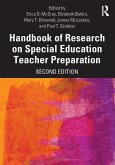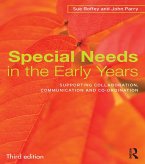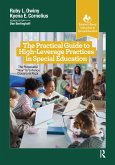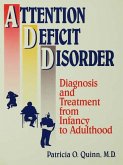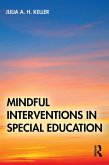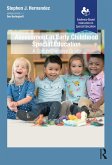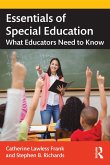55,95 €
55,95 €
inkl. MwSt.
Sofort per Download lieferbar

28 °P sammeln
55,95 €
Als Download kaufen

55,95 €
inkl. MwSt.
Sofort per Download lieferbar

28 °P sammeln
Jetzt verschenken
Alle Infos zum eBook verschenken
55,95 €
inkl. MwSt.
Sofort per Download lieferbar
Alle Infos zum eBook verschenken

28 °P sammeln
- Format: ePub
- Merkliste
- Auf die Merkliste
- Bewerten Bewerten
- Teilen
- Produkt teilen
- Produkterinnerung
- Produkterinnerung

Bitte loggen Sie sich zunächst in Ihr Kundenkonto ein oder registrieren Sie sich bei
bücher.de, um das eBook-Abo tolino select nutzen zu können.
Hier können Sie sich einloggen
Hier können Sie sich einloggen
Sie sind bereits eingeloggt. Klicken Sie auf 2. tolino select Abo, um fortzufahren.

Bitte loggen Sie sich zunächst in Ihr Kundenkonto ein oder registrieren Sie sich bei bücher.de, um das eBook-Abo tolino select nutzen zu können.
Early Childhood Special Education Programs and Practices is a special education textbook that prepares pre- and in-service teachers with the knowledge, skills, and dispositions to deliver evidence-based instruction to promote positive academic and behavioral outcomes for young children with development delays and/or disabilities.
- Geräte: eReader
- ohne Kopierschutz
- eBook Hilfe
- Größe: 2.84MB
Andere Kunden interessierten sich auch für
![Handbook of Research on Special Education Teacher Preparation (eBook, ePUB) Handbook of Research on Special Education Teacher Preparation (eBook, ePUB)]() Handbook of Research on Special Education Teacher Preparation (eBook, ePUB)130,95 €
Handbook of Research on Special Education Teacher Preparation (eBook, ePUB)130,95 €![Special Needs in the Early Years (eBook, ePUB) Special Needs in the Early Years (eBook, ePUB)]() Sue RoffeySpecial Needs in the Early Years (eBook, ePUB)37,95 €
Sue RoffeySpecial Needs in the Early Years (eBook, ePUB)37,95 €![The Practical Guide to High-Leverage Practices in Special Education (eBook, ePUB) The Practical Guide to High-Leverage Practices in Special Education (eBook, ePUB)]() Ruby L. OwinyThe Practical Guide to High-Leverage Practices in Special Education (eBook, ePUB)36,95 €
Ruby L. OwinyThe Practical Guide to High-Leverage Practices in Special Education (eBook, ePUB)36,95 €![Attention Deficit Disorder (eBook, ePUB) Attention Deficit Disorder (eBook, ePUB)]() Patricia O. QuinnAttention Deficit Disorder (eBook, ePUB)28,95 €
Patricia O. QuinnAttention Deficit Disorder (eBook, ePUB)28,95 €![Mindful Interventions in Special Education (eBook, ePUB) Mindful Interventions in Special Education (eBook, ePUB)]() Julia A. H. KellerMindful Interventions in Special Education (eBook, ePUB)38,95 €
Julia A. H. KellerMindful Interventions in Special Education (eBook, ePUB)38,95 €![Assessment in Early Childhood Special Education (eBook, ePUB) Assessment in Early Childhood Special Education (eBook, ePUB)]() Stephen J. HernandezAssessment in Early Childhood Special Education (eBook, ePUB)40,95 €
Stephen J. HernandezAssessment in Early Childhood Special Education (eBook, ePUB)40,95 €![Essentials of Special Education (eBook, ePUB) Essentials of Special Education (eBook, ePUB)]() Catherine Lawless FrankEssentials of Special Education (eBook, ePUB)40,95 €
Catherine Lawless FrankEssentials of Special Education (eBook, ePUB)40,95 €-
-
-
Early Childhood Special Education Programs and Practices is a special education textbook that prepares pre- and in-service teachers with the knowledge, skills, and dispositions to deliver evidence-based instruction to promote positive academic and behavioral outcomes for young children with development delays and/or disabilities.
Dieser Download kann aus rechtlichen Gründen nur mit Rechnungsadresse in A, B, BG, CY, CZ, D, DK, EW, E, FIN, F, GR, HR, H, IRL, I, LT, L, LR, M, NL, PL, P, R, S, SLO, SK ausgeliefert werden.
Produktdetails
- Produktdetails
- Verlag: Taylor & Francis eBooks
- Erscheinungstermin: 1. Juni 2024
- Englisch
- ISBN-13: 9781040142844
- Artikelnr.: 70884043
- Verlag: Taylor & Francis eBooks
- Erscheinungstermin: 1. Juni 2024
- Englisch
- ISBN-13: 9781040142844
- Artikelnr.: 70884043
- Herstellerkennzeichnung Die Herstellerinformationen sind derzeit nicht verfügbar.
Karin M. Fisher, PhD, CDE started her career in education when she earned her master's of art in teaching special education from the University of Central Florida in Orlando, Florida. She taught students with moderate intellectual disabilities and autism as a self-contained, resource, and inclusion teacher for 8 years. She was also the co-department chair for her school's large special education department. In 2013, she was accepted into a grant program at the University of Central Florida to start her career in academia, earning her PhD in 2016. Her dissertation compared standardized science scores with participation in extracurricular science, technology, engineering, and mathematics activities.
Currently, Dr. Fisher teaches undergraduate and graduate courses at Georgia Southern University in the Department of Elementary and Special Education in Statesboro, Georgia. Her courses include special education procedures, methods, leadership, curriculum and instruction, language development, and collaboration. She also has extensive experience supervising special education internships.
Dr. Fisher was nominated for and accepted the position of vice president, president elect, and eventually will be president of the Georgia Council for Exceptional Children. She co-chairs the Early Career Faculty Special Interest Group of the Teacher Education Division of the Council for Exceptional Children and is a member of the Division for Early Childhood. She also was selected to co-chair the Georgia State Special Education Advisory Panel where she represents parents of students with disabilities in her district as well as institutes in higher education across the state. As the parent of a son with an autism spectrum disorder, she is in a unique position to view special education from the educator and parent lens.
Dr. Fisher's work reflects her expertise in early childhood special education. She has extensive experience using and teaching evidence-based strategies and high-leverage practices in special education. Her education and experience working with her son, academic peers, students, their families, school personnel, and administrators contribute to her qualifications to edit and contribute to this text.
Kate E. Zimmer, PhD received a bachelor's degree in elementary education from Saint Leo University, St. Leo, Florida, and a master's degree in curriculum and instruction from the University of Central Florida in Orlando, Florida. Dr. Zimmer taught at the elementary level for 7 years in a multi-age classroom serving students with a variety of special needs. She was also involved in pediatric research on attention-deficit/hyperactivity disorder, childhood anxiety, and childhood depression. In 2013, she graduated with her PhD in special education from the University of Florida, Gainesville, Florida, where she examined the effects of a storybook reading intervention on the initiation of joint attention in young children with autism.
Dr. Zimmer is currently Branch Alliance for Educator Diversity's Director of the BIRCH Professional Learning Center in Austin, Texas. In this role, Dr. Zimmer collaborates with the BIRCH professional learning and development team to create goals and design trainings for in-person and virtual programs, resources, and learning communities. In addition, Dr. Zimmer leads Branch Alliance for Educator Diversity's mixed-reality simulation laboratory where she provides leadership by coordinating and directing activities to ensure the successful operation of the laboratory. These activities include technical direction, simulation design, strategic planning, fundraising, outreach, partnerships, and working closely with simulation specialists to ensure quality control. In recent years, her research focus has been on teacher preparation, high-leverage practices, and mixed-reality simulation. Dr. Zimmer works with numerous faculty members and external partners to purposefully embed mixed-reality simulation within courses and professional development so that pre- and in-service teachers are able to engage in a powerful, interactive learning experience that prepares them for the real world and hones in on specific teaching strategies that impact student outcomes.
Dr. Zimmer has taught both graduate and undergraduate courses that focused on autism, behavior, curriculum and instruction, and instructional practices. She developed an online graduate endorsement in autism spectrum disorders and works closely with the Early Childhood Faculty Special Interest Group in the Teacher Education Division of the Council for Exceptional Children. Her numerous peer-reviewed presentations, articles, and grants along with her passion for teacher education make her an excellent co-author and editor for this textbook.
Currently, Dr. Fisher teaches undergraduate and graduate courses at Georgia Southern University in the Department of Elementary and Special Education in Statesboro, Georgia. Her courses include special education procedures, methods, leadership, curriculum and instruction, language development, and collaboration. She also has extensive experience supervising special education internships.
Dr. Fisher was nominated for and accepted the position of vice president, president elect, and eventually will be president of the Georgia Council for Exceptional Children. She co-chairs the Early Career Faculty Special Interest Group of the Teacher Education Division of the Council for Exceptional Children and is a member of the Division for Early Childhood. She also was selected to co-chair the Georgia State Special Education Advisory Panel where she represents parents of students with disabilities in her district as well as institutes in higher education across the state. As the parent of a son with an autism spectrum disorder, she is in a unique position to view special education from the educator and parent lens.
Dr. Fisher's work reflects her expertise in early childhood special education. She has extensive experience using and teaching evidence-based strategies and high-leverage practices in special education. Her education and experience working with her son, academic peers, students, their families, school personnel, and administrators contribute to her qualifications to edit and contribute to this text.
Kate E. Zimmer, PhD received a bachelor's degree in elementary education from Saint Leo University, St. Leo, Florida, and a master's degree in curriculum and instruction from the University of Central Florida in Orlando, Florida. Dr. Zimmer taught at the elementary level for 7 years in a multi-age classroom serving students with a variety of special needs. She was also involved in pediatric research on attention-deficit/hyperactivity disorder, childhood anxiety, and childhood depression. In 2013, she graduated with her PhD in special education from the University of Florida, Gainesville, Florida, where she examined the effects of a storybook reading intervention on the initiation of joint attention in young children with autism.
Dr. Zimmer is currently Branch Alliance for Educator Diversity's Director of the BIRCH Professional Learning Center in Austin, Texas. In this role, Dr. Zimmer collaborates with the BIRCH professional learning and development team to create goals and design trainings for in-person and virtual programs, resources, and learning communities. In addition, Dr. Zimmer leads Branch Alliance for Educator Diversity's mixed-reality simulation laboratory where she provides leadership by coordinating and directing activities to ensure the successful operation of the laboratory. These activities include technical direction, simulation design, strategic planning, fundraising, outreach, partnerships, and working closely with simulation specialists to ensure quality control. In recent years, her research focus has been on teacher preparation, high-leverage practices, and mixed-reality simulation. Dr. Zimmer works with numerous faculty members and external partners to purposefully embed mixed-reality simulation within courses and professional development so that pre- and in-service teachers are able to engage in a powerful, interactive learning experience that prepares them for the real world and hones in on specific teaching strategies that impact student outcomes.
Dr. Zimmer has taught both graduate and undergraduate courses that focused on autism, behavior, curriculum and instruction, and instructional practices. She developed an online graduate endorsement in autism spectrum disorders and works closely with the Early Childhood Faculty Special Interest Group in the Teacher Education Division of the Council for Exceptional Children. Her numerous peer-reviewed presentations, articles, and grants along with her passion for teacher education make her an excellent co-author and editor for this textbook.
Acknowledgments About the Editors Contributing AuthorsIntroduction Chapter 1 Overview of Early Childhood and Development (Ages 4 to 8)Karin M. Fisher
PhD
CDE and Kate E. Zimmer
PhD Chapter 2 Using Culturally Relevant Pedagogy With All Children and FamiliesNai-Cheng Kuo
PhD
BCBA Chapter 3 Early Childhood Assessments (Ages 4 to 8)Melissa K. Driver
PhD and Christie H. Ingram
MEd Chapter 4 Positive Behavioral Supports and Strategies for Young ChildrenKathy Ralabate Doody
PhD and Gliset Colón
PhD Chapter 5 Planning for SuccessMarla J. Lohmann
PhD; Ariane N. Gauvreau
PhD
BCBA-D;and Katrina A. Hovey
PhD Chapter 6 Language Development (Prekindergarten to Second Grade)Sherri K. Prosser
PhD; Kate E. Zimmer
PhD; Zachary T. Barnes
PhD;and Karin M. Fisher
PhD
CDE Chapter 7 Early Childhood ReadingDena D. Slanda
PhD and Marisa Macy
PhD Chapter 8 Emergent Writing in the Early Childhood YearsMarisa Macy
PhD and Dena D. Slanda
PhD Chapter 9 Early Childhood Mathematics (Ages 4 to 8)Lisa A. Finnegan
PhD Chapter 10 Teaching Science to Students With Disabilities in Early Childhood ClassroomsKarin M. Fisher
PhD
CDE and Kania A. Greer
EdD Chapter 11 Social Studies in Prekindergarten to Second-Grade ClassroomsStacy Delacruz
EdD and Raynice Jean-Sigur
PhD Chapter 12 Social-Emotional Learning for Young ChildrenMarla J. Lohmann
PhD; Kania A. Greer
EdD; and Marisa Macy
PhDConclusion by Kate E. Zimmer
PhD and Karin M. Fisher
PhD
CDEGlossaryFinancial Disclosures Index
PhD
CDE and Kate E. Zimmer
PhD Chapter 2 Using Culturally Relevant Pedagogy With All Children and FamiliesNai-Cheng Kuo
PhD
BCBA Chapter 3 Early Childhood Assessments (Ages 4 to 8)Melissa K. Driver
PhD and Christie H. Ingram
MEd Chapter 4 Positive Behavioral Supports and Strategies for Young ChildrenKathy Ralabate Doody
PhD and Gliset Colón
PhD Chapter 5 Planning for SuccessMarla J. Lohmann
PhD; Ariane N. Gauvreau
PhD
BCBA-D;and Katrina A. Hovey
PhD Chapter 6 Language Development (Prekindergarten to Second Grade)Sherri K. Prosser
PhD; Kate E. Zimmer
PhD; Zachary T. Barnes
PhD;and Karin M. Fisher
PhD
CDE Chapter 7 Early Childhood ReadingDena D. Slanda
PhD and Marisa Macy
PhD Chapter 8 Emergent Writing in the Early Childhood YearsMarisa Macy
PhD and Dena D. Slanda
PhD Chapter 9 Early Childhood Mathematics (Ages 4 to 8)Lisa A. Finnegan
PhD Chapter 10 Teaching Science to Students With Disabilities in Early Childhood ClassroomsKarin M. Fisher
PhD
CDE and Kania A. Greer
EdD Chapter 11 Social Studies in Prekindergarten to Second-Grade ClassroomsStacy Delacruz
EdD and Raynice Jean-Sigur
PhD Chapter 12 Social-Emotional Learning for Young ChildrenMarla J. Lohmann
PhD; Kania A. Greer
EdD; and Marisa Macy
PhDConclusion by Kate E. Zimmer
PhD and Karin M. Fisher
PhD
CDEGlossaryFinancial Disclosures Index
Acknowledgments About the Editors Contributing AuthorsIntroduction Chapter 1 Overview of Early Childhood and Development (Ages 4 to 8)Karin M. Fisher
PhD
CDE and Kate E. Zimmer
PhD Chapter 2 Using Culturally Relevant Pedagogy With All Children and FamiliesNai-Cheng Kuo
PhD
BCBA Chapter 3 Early Childhood Assessments (Ages 4 to 8)Melissa K. Driver
PhD and Christie H. Ingram
MEd Chapter 4 Positive Behavioral Supports and Strategies for Young ChildrenKathy Ralabate Doody
PhD and Gliset Colón
PhD Chapter 5 Planning for SuccessMarla J. Lohmann
PhD; Ariane N. Gauvreau
PhD
BCBA-D;and Katrina A. Hovey
PhD Chapter 6 Language Development (Prekindergarten to Second Grade)Sherri K. Prosser
PhD; Kate E. Zimmer
PhD; Zachary T. Barnes
PhD;and Karin M. Fisher
PhD
CDE Chapter 7 Early Childhood ReadingDena D. Slanda
PhD and Marisa Macy
PhD Chapter 8 Emergent Writing in the Early Childhood YearsMarisa Macy
PhD and Dena D. Slanda
PhD Chapter 9 Early Childhood Mathematics (Ages 4 to 8)Lisa A. Finnegan
PhD Chapter 10 Teaching Science to Students With Disabilities in Early Childhood ClassroomsKarin M. Fisher
PhD
CDE and Kania A. Greer
EdD Chapter 11 Social Studies in Prekindergarten to Second-Grade ClassroomsStacy Delacruz
EdD and Raynice Jean-Sigur
PhD Chapter 12 Social-Emotional Learning for Young ChildrenMarla J. Lohmann
PhD; Kania A. Greer
EdD; and Marisa Macy
PhDConclusion by Kate E. Zimmer
PhD and Karin M. Fisher
PhD
CDEGlossaryFinancial Disclosures Index
PhD
CDE and Kate E. Zimmer
PhD Chapter 2 Using Culturally Relevant Pedagogy With All Children and FamiliesNai-Cheng Kuo
PhD
BCBA Chapter 3 Early Childhood Assessments (Ages 4 to 8)Melissa K. Driver
PhD and Christie H. Ingram
MEd Chapter 4 Positive Behavioral Supports and Strategies for Young ChildrenKathy Ralabate Doody
PhD and Gliset Colón
PhD Chapter 5 Planning for SuccessMarla J. Lohmann
PhD; Ariane N. Gauvreau
PhD
BCBA-D;and Katrina A. Hovey
PhD Chapter 6 Language Development (Prekindergarten to Second Grade)Sherri K. Prosser
PhD; Kate E. Zimmer
PhD; Zachary T. Barnes
PhD;and Karin M. Fisher
PhD
CDE Chapter 7 Early Childhood ReadingDena D. Slanda
PhD and Marisa Macy
PhD Chapter 8 Emergent Writing in the Early Childhood YearsMarisa Macy
PhD and Dena D. Slanda
PhD Chapter 9 Early Childhood Mathematics (Ages 4 to 8)Lisa A. Finnegan
PhD Chapter 10 Teaching Science to Students With Disabilities in Early Childhood ClassroomsKarin M. Fisher
PhD
CDE and Kania A. Greer
EdD Chapter 11 Social Studies in Prekindergarten to Second-Grade ClassroomsStacy Delacruz
EdD and Raynice Jean-Sigur
PhD Chapter 12 Social-Emotional Learning for Young ChildrenMarla J. Lohmann
PhD; Kania A. Greer
EdD; and Marisa Macy
PhDConclusion by Kate E. Zimmer
PhD and Karin M. Fisher
PhD
CDEGlossaryFinancial Disclosures Index

